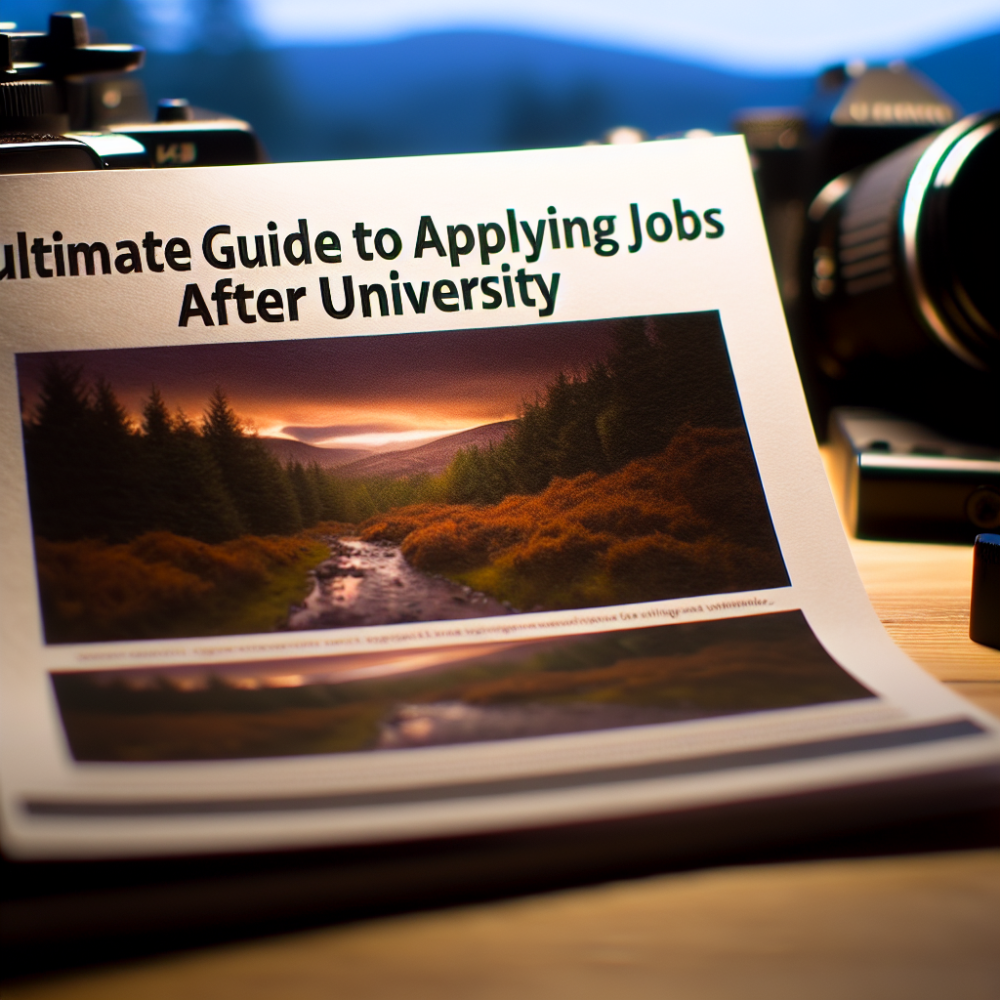Crafting an Impressive Resume and Cover Letter
Applying for Jobs After University: The Ultimate Guide
Crafting an Impressive Resume and Cover Letter
When it comes to applying for jobs after university, one of the most crucial steps is crafting an impressive resume and cover letter. These documents are your first opportunity to make a positive impression on potential employers, so it’s essential to get them right. In this section, we will guide you through the process of creating a standout resume and cover letter that will help you land your dream job.
First and foremost, it’s important to understand the purpose of a resume. A resume is a concise summary of your education, skills, and work experience. It should highlight your most relevant qualifications and achievements, making it easy for employers to see why you are a strong candidate for the position. To create an effective resume, start by carefully reviewing the job description and tailoring your document to match the requirements and responsibilities outlined.
Begin your resume with a clear and professional summary statement that briefly introduces yourself and highlights your key strengths. This statement should grab the reader’s attention and make them want to learn more about you. Following the summary, include sections for your education, work experience, skills, and any relevant certifications or achievements. Be sure to include specific examples and quantify your accomplishments whenever possible to demonstrate your impact and abilities.
In addition to the content, the format and layout of your resume are also crucial. Use a clean and professional design that is easy to read and navigate. Choose a font that is legible and stick to a consistent format throughout the document. Use bullet points to organize information and make it easier for employers to scan your resume quickly. Remember to keep your resume concise, ideally fitting onto one page, unless you have extensive relevant experience.
Once your resume is complete, it’s time to move on to the cover letter. A cover letter is your opportunity to introduce yourself to the employer and explain why you are interested in the position. It should complement your resume by expanding on your qualifications and providing additional context. Start your cover letter with a professional greeting and a brief introduction that states the position you are applying for and how you learned about it.
In the body of your cover letter, highlight your most relevant skills and experiences that make you a strong fit for the role. Use specific examples to demonstrate your abilities and show how they align with the company’s values and goals. Avoid simply restating what is already on your resume; instead, use the cover letter to provide more depth and insight into your qualifications. Be sure to address any specific requirements or qualifications mentioned in the job description.
Finally, conclude your cover letter by expressing your enthusiasm for the opportunity and your willingness to further discuss your qualifications in an interview. Thank the employer for considering your application and provide your contact information for their convenience. Before sending your resume and cover letter, proofread them carefully to ensure there are no errors or typos. Consider asking a trusted friend or mentor to review them as well, as a fresh pair of eyes can often catch mistakes that you may have missed.
Crafting an impressive resume and cover letter is a crucial step in the job application process. By tailoring your documents to match the job requirements, using specific examples to demonstrate your qualifications, and presenting them in a clean and professional format, you will greatly increase your chances of standing out to potential employers. Remember, your resume and cover letter are your first opportunity to make a positive impression, so take the time to make them shine.
Navigating the Job Search Process: Where to Look and How to Apply
Navigating the Job Search Process: Where to Look and How to Apply
After years of hard work and dedication, you have finally graduated from university. Now, it’s time to enter the real world and find a job that aligns with your skills and interests. But where do you start? The job search process can be overwhelming, but with the right guidance, you can navigate it successfully.
The first step in your job search is to determine where to look for job opportunities. There are several avenues you can explore, both online and offline. One of the most popular online platforms is LinkedIn, a professional networking site where you can connect with potential employers and browse job postings. Additionally, many companies have their own websites where they advertise job openings. It’s also worth checking out job search engines like Indeed or Monster, which aggregate job postings from various sources.
In addition to online platforms, don’t underestimate the power of networking. Reach out to your university alumni network, attend career fairs, and join professional organizations related to your field. Networking can often lead to hidden job opportunities that may not be advertised publicly.
Once you have identified where to look for job opportunities, the next step is to understand how to apply effectively. Start by tailoring your resume and cover letter to each job you apply for. Highlight your relevant skills and experiences that make you a strong candidate for the position. Be sure to proofread your application materials carefully to avoid any spelling or grammatical errors.
When it comes to submitting your application, follow the instructions provided by the employer. Some companies may require you to apply through their website, while others may prefer email or even traditional mail. Pay attention to any additional documents or forms they may request, such as transcripts or writing samples.
In addition to submitting your application, it’s important to follow up with the employer. After a week or two, send a polite email expressing your continued interest in the position and asking for an update on the hiring process. This demonstrates your enthusiasm and professionalism.
While waiting to hear back from potential employers, it’s a good idea to continue expanding your skills and knowledge. Consider taking online courses or attending workshops to enhance your qualifications. This not only makes you a more competitive candidate but also shows your dedication to personal and professional growth.
If you receive an invitation for an interview, congratulations! This is your chance to showcase your skills and personality to the employer. Prepare for the interview by researching the company, practicing common interview questions, and preparing thoughtful questions to ask the interviewer. Dress professionally and arrive on time to make a positive impression.
During the interview, be confident and articulate. Highlight your relevant experiences and provide specific examples to support your answers. Remember to ask for feedback at the end of the interview and express your gratitude for the opportunity.
After the interview, send a thank-you email or letter to the interviewer to express your appreciation for their time and consideration. This small gesture can leave a lasting impression and may even tip the scales in your favor.
In conclusion, navigating the job search process after university can be challenging, but with the right strategies, you can increase your chances of success. Start by identifying where to look for job opportunities, both online and offline. Tailor your application materials to each job and follow the instructions provided by the employer. Continue expanding your skills while waiting to hear back, and prepare thoroughly for interviews. Remember to follow up and express gratitude after each interaction. With perseverance and determination, you will find the job that is the perfect fit for you.
Mastering the Art of Interviews: Tips and Techniques
Mastering the Art of Interviews: Tips and Techniques
After completing your university education, the next step is to enter the job market and secure a position that aligns with your career goals. One crucial aspect of this process is mastering the art of interviews. Interviews provide employers with an opportunity to assess your skills, qualifications, and suitability for the role. To help you succeed in this crucial stage, we have compiled a list of tips and techniques that will guide you through the interview process.
First and foremost, it is essential to thoroughly research the company you are interviewing with. Familiarize yourself with their mission, values, and recent achievements. This knowledge will not only impress the interviewer but also enable you to tailor your responses to align with the company’s goals. Additionally, researching the role you are applying for will allow you to understand the specific skills and qualifications the employer is seeking.
Once you have a solid understanding of the company and the role, it is time to prepare for the interview questions. Start by reviewing common interview questions and brainstorming potential responses. Consider your past experiences, both academic and professional, and identify examples that demonstrate your skills and abilities. It is crucial to provide specific examples rather than vague statements to showcase your qualifications effectively.
In addition to preparing responses, practicing your delivery is equally important. Enlist the help of a friend or family member to conduct mock interviews. This will allow you to refine your answers, improve your confidence, and identify areas where you may need further preparation. Pay attention to your body language, tone of voice, and overall demeanor during these practice sessions.
During the actual interview, it is crucial to make a positive first impression. Dress professionally, arrive on time, and greet the interviewer with a firm handshake and a smile. Maintain eye contact throughout the interview to demonstrate your attentiveness and engagement. Remember to listen carefully to the questions asked and take a moment to gather your thoughts before responding. This will ensure that your answers are thoughtful and well-structured.
In addition to answering questions, it is essential to ask thoughtful and relevant questions of your own. This demonstrates your interest in the role and the company. Prepare a list of questions in advance, focusing on topics such as company culture, career progression, and the specific responsibilities of the role. Avoid asking questions that can easily be answered by a quick internet search, as this may give the impression that you did not adequately prepare for the interview.
Finally, after the interview, it is crucial to follow up with a thank-you note or email. Express your gratitude for the opportunity to interview and reiterate your interest in the position. This simple gesture demonstrates your professionalism and leaves a positive impression on the interviewer.
In conclusion, mastering the art of interviews is essential for securing a job after university. Thoroughly researching the company, preparing responses to common interview questions, and practicing your delivery are all crucial steps in the process. Making a positive first impression, listening carefully, and asking thoughtful questions during the interview are also key factors in success. Finally, following up with a thank-you note or email shows your professionalism and leaves a lasting impression. By following these tips and techniques, you will be well-prepared to navigate the interview process and increase your chances of landing your dream job.
Showcasing Your Skills and Experience: Building a Strong Portfolio
Applying for Jobs After University: The Ultimate Guide
Showcasing Your Skills and Experience: Building a Strong Portfolio
When it comes to applying for jobs after university, having a strong portfolio can make all the difference. Your portfolio is a tangible representation of your skills, experience, and accomplishments, and it allows potential employers to see what you can bring to the table. In this section, we will explore the key elements of building a strong portfolio that will impress hiring managers and increase your chances of landing your dream job.
First and foremost, it is important to understand what exactly should be included in your portfolio. While the specific requirements may vary depending on your field of study and the industry you are targeting, there are a few general guidelines that apply to most portfolios. Your portfolio should showcase your best work, highlight your skills and achievements, and demonstrate your ability to solve problems and think critically.
One of the most effective ways to showcase your skills and experience is through projects and assignments you completed during your time at university. These can include research papers, case studies, group projects, or any other work that demonstrates your ability to apply your knowledge in a practical setting. Be sure to include a variety of projects that highlight different aspects of your skills and expertise.
In addition to academic work, including any internships, part-time jobs, or volunteer experiences you have had can greatly enhance your portfolio. These experiences show potential employers that you have real-world experience and have been able to apply your skills in a professional setting. Be sure to include a brief description of your responsibilities and accomplishments in each role, as well as any notable achievements or recognition you received.
Another important element of a strong portfolio is the inclusion of any certifications or additional training you have completed. This can include workshops, seminars, online courses, or any other form of professional development that is relevant to the job you are applying for. These certifications demonstrate your commitment to continuous learning and can give you a competitive edge over other candidates.
When organizing your portfolio, it is important to present your work in a clear and professional manner. Use a consistent format and layout throughout, and make sure that all documents are easy to read and understand. Consider creating an online portfolio or website where you can showcase your work digitally, as this can make it easier for potential employers to access and review your materials.
Lastly, don’t forget to include a brief introduction or personal statement at the beginning of your portfolio. This should provide a summary of who you are, what you have to offer, and what you are looking for in your career. It is also a good idea to include your contact information and any relevant social media profiles or professional websites.
In conclusion, building a strong portfolio is an essential step in applying for jobs after university. By showcasing your skills, experience, and achievements, you can demonstrate to potential employers that you are a qualified and capable candidate. Remember to include a variety of projects, highlight any internships or additional training, and present your work in a clear and professional manner. With a strong portfolio in hand, you will be well-equipped to impress hiring managers and secure the job of your dreams.
Standing Out from the Competition: Networking and Personal Branding
Applying for jobs after university can be a daunting task, especially in today’s competitive job market. With so many qualified candidates vying for the same positions, it’s crucial to find ways to stand out from the competition. One effective strategy is to focus on networking and personal branding.
Networking is a powerful tool that can open doors and create opportunities. Building a strong professional network can help you gain insights into the industry, connect with influential individuals, and even secure job referrals. It’s important to start networking early, even while still in university. Attend career fairs, industry events, and alumni gatherings to meet professionals in your field of interest. Engage in conversations, ask questions, and exchange contact information. Remember, networking is not just about collecting business cards; it’s about building meaningful relationships.
In addition to in-person networking, online networking has become increasingly important in today’s digital age. Platforms like LinkedIn provide a valuable space to connect with professionals, join industry groups, and showcase your skills and experiences. Make sure your LinkedIn profile is up-to-date and professional, highlighting your education, internships, and any relevant projects or achievements. Actively engage with others by commenting on posts, sharing industry news, and participating in discussions. This will help you establish yourself as a knowledgeable and engaged professional.
Another crucial aspect of standing out from the competition is personal branding. Your personal brand is how you present yourself to the world and how others perceive you. It’s important to develop a strong personal brand that aligns with your career goals and showcases your unique strengths and skills. Start by identifying your core values, passions, and strengths. What sets you apart from others? What unique skills or experiences do you bring to the table?
Once you have a clear understanding of your personal brand, it’s time to communicate it effectively. This starts with your resume and cover letter. Tailor these documents to highlight your relevant experiences and skills, emphasizing how they align with the job requirements. Use strong action verbs and quantify your achievements whenever possible. Your resume and cover letter should be concise, well-organized, and error-free.
In addition to your application materials, your online presence should also reflect your personal brand. Clean up your social media profiles and ensure that they present a professional image. Consider creating a personal website or blog to showcase your work, share your thoughts on industry trends, and demonstrate your expertise. This can be a powerful tool to differentiate yourself from other candidates and show potential employers that you are proactive and passionate about your field.
Lastly, don’t underestimate the power of a strong personal pitch. This is a concise and compelling statement that summarizes who you are, what you do, and what you can offer to potential employers. Practice your personal pitch until it feels natural and confident. You never know when you might run into a potential employer or industry professional, so always be prepared to make a strong impression.
In conclusion, standing out from the competition when applying for jobs after university requires a combination of networking and personal branding. By building a strong professional network, both in-person and online, and developing a clear and compelling personal brand, you can differentiate yourself from other candidates and increase your chances of landing your dream job. Remember, it’s not just about what you know, but who you know and how you present yourself.







Leave a Reply
You must be logged in to post a comment.